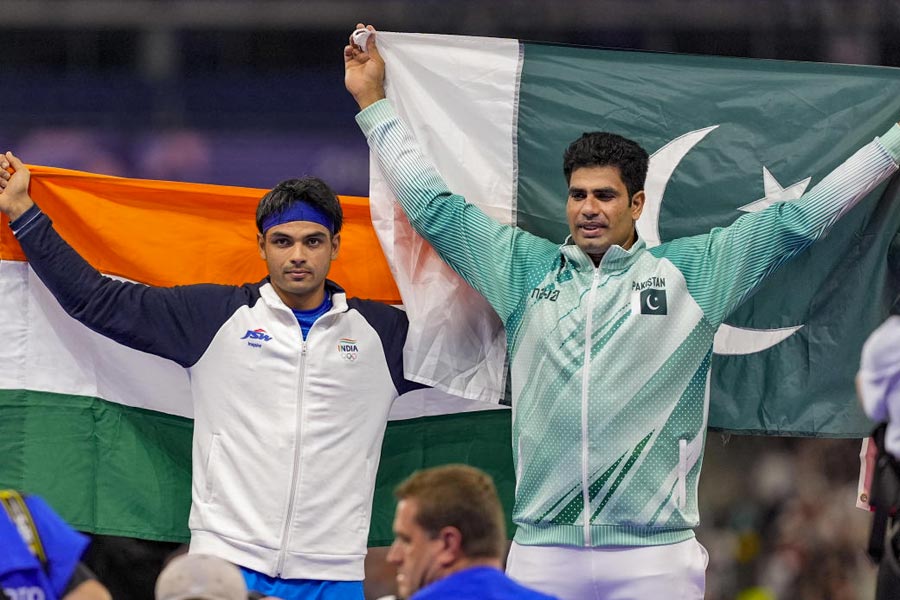Kind lessons
Sir — Sports can be a great unifier. While contests between India and Pakistan have historically polarised audiences in both nations, the Olympic Games saw a rare moment of unity. The Indian and the Pakistani javelin throwers, Neeraj Chopra and Arshad Nadeem, respectively, may have won medals but it is their mothers who won hearts. Each mother stated that the player from the other nation was like her son as well. Perhaps the Board of Control for Cricket in India, which refuses to send Indian cricketers to Pakistan for the Champions Trophy, can learn brotherhood and sportsmanship from them.
Stuti Ghosh,
Calcutta
End of an era
Sir — The face of the ‘reformist’ Left and the erstwhile chief minister of West Bengal, Buddhadeb Bhattacharjee, is no more (“The many hats: Politician, poet and bhadralok”, Aug 9). Bhattacharjee had hoped to bring industrialisation to the state. Ironically, it was land acquisition for industrial purposes — this included a plan to build the country’s largest integrated steel plant in Salboni, a chemical hub in Nayachar, a special economic zone in Nandigram and a Tata plant in Singur — that paved the way for the Left’s defeat in the 2011 election.
Bhattacharjee was deeply interested in culture and literature. Even after becoming the chief minister, he would often be found interacting with literary personalities at Nandan. Bhattacharjee authored many books, including translations of the works of Gabriel García Márquez and Vladimir Mayakovsky.
In 2022, the Narendra Modi government bestowed the Padma Bhushan on Bhattacharjee which he refused to accept. He was one of the most respectable politicians whose heart was in the right place.
Bidyut Kumar Chatterjee,
Faridabad
Sir — As the chief minister of Bengal, Buddhadeb Bhattacharjee had succumbed to the muscle-flexing of fundamentalists who demanded the expulsion of Taslima Nasrin from Calcutta. He had also adopted controversial industrial policies regarding Singur and Nandigram. But as an individual, Bhattacharjee led a humble life, which is rare among politicians.
Kajal Chatterjee,
Calcutta
Sir — The passing away of Buddhadeb Bhattacharjee marks the end of the era of bhadralok politicians. Known for his trademark white dhuti-panjabi, Bhattacharjee was also a playwright and poet. An alumnus of Calcutta’s elite Presidency College, he fit the bill of an old-school Bengali intellectual. Bhattacharjee restored the white paint of the Shaheed Minar, which was painted red by the first Left Front government. In Bengal, the Communist Party of India (Marxist) drew flak from its critics for the exodus of industries from the state. Bhattacharjee wanted to change the narrative and pushed for industrialisation in the state. However, his efforts were misguided.
Shovanlal Chakraborty,
Calcutta
Sir — Buddhadeb Bhattacharjee’s death has brought a chapter of West Bengal politics to a close. During his tenure as chief minister, Bengal saw investments in sectors like information technology. His contributions to the state and the complexities of his term and decisions will continue to be studied and debated in the context of India’s political evolution.
Ranganathan Sivakumar,
Chennai
Sir — Buddhadeb Bhattacharjee was known for his intellectual rigour, literary acumen and deep commitment to the ideals of socialism. He was seen as a bridge between the ideological rigidity of his party and the pragmatic demands of governance. His dedication to the cause of the Left Front was unwavering. His principles are best demonstrated by his pledge to donate his body to a government hospital for research.
N. Sadhasiva Reddy,
Bengaluru











